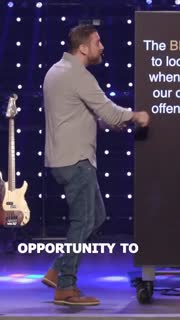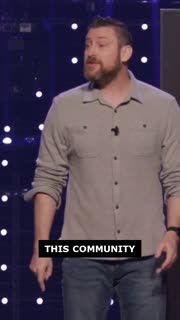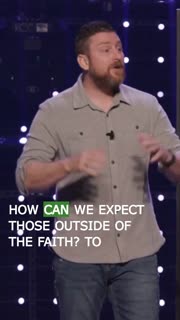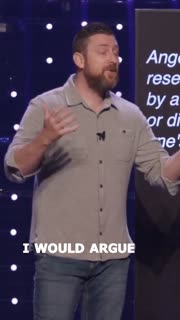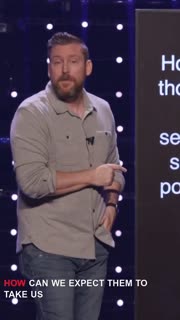Unity in Christ: Navigating Politics with Grace
Devotional
Sermon Summary
Bible Study Guide
Sermon Clips
### Quotes for Outreach
1. "The best opportunity to look like Jesus is when we respond to our own anger and offense with love. Love. Love. God loves us. And he loves you. And he's called us to lead with love. And you can choose to live your life being offended and in your disagreements. You know, chucking stones and throwing words and posting pictures. But I'm telling you it doesn't move the mission forward." [55:09] (31 seconds)
2. "You win. By how you love people. So let's love well." [57:24] (7 seconds)
3. "We have received your love in all of its fullness. And I pray that in the midst of. So many conversations. So much disunity. So much emotion. Your church would be calm. As we find ourselves this morning on a firm foundation. Filled with your spirit. With an incredible story of God. moved on our behalf sending his son down to this earth. And his son dying for us. So that for those who may believe. We would receive life." [58:11] (43 seconds)
4. "If you wanted this community to be the best it can be, then we actually have a lot in common because that's what we are for as well. We want this place to be the best. The best it can be. And I know that when I say that, there's more behind that because Jesus is the source of my salvation. But I start with what we're for way before I ever get to what we are against or potentially what we don't have in common." [32:18] (26 seconds)
5. "How can we expect those outside of the faith? To take us seriously, to sit down and have a conversation with us when we allow our politics to lead first before our faith. Faith. I'm just telling you. It leads with love. I didn't make that up. Jesus preached it. John taught it. Paul reminded all the churches about it." [50:54] (21 seconds)
### Quotes for Members
1. "The goal of this series isn't for our church to all agree on everything politically. It's never going to happen. And I think that's an okay thing. In fact, the more diverse we are, the more positive disruption we make in our community. So it's okay, we're going to disagree. But in the midst of our disagreements, I hope, and I hope you hope, that as we do this, we're going to be able to do this. If we disagree, we don't automatically become cause for disunity." [21:20] (25 seconds)
2. "I would argue that Christians, okay? Christians to be the least offended people on the planet. Because when you allow offense to creep into your life, you get weighted down. All of a sudden, you take your eyes on the most important things in the context of church. That would be, you know, the mission that God has called us to. All of a sudden, when you become offended, then you get defensive or you go on the attack. And all of a sudden, we kind of lose. We lose sight of all the other, you know, important things and potentially the most important things." [28:34] (32 seconds)
3. "How can we expect those outside our faith to take us seriously when they see us prioritizing politics over Jesus? How can we? We lose influence. We lose credibility. We become hypocritical. In certain conversations, and we do this in politics a lot, when we begin leveraging political things. First, before we go home, go, what does Jesus say about this? Well, you know, how would Jesus respond to this? You know, what would Jesus do with this?" [45:04] (32 seconds)
4. "Jesus' approach, he leads with grace. Ray before he leads with truth. And he does lead with grace. He leads with truth. But again, here's the question. I'm just telling you. Come on. How can we expect those outside of the faith? How can we expect those outside of the faith? To take us seriously, to sit down and have a conversation with us when we allow our politics to lead first before our faith." [50:15] (24 seconds)
5. "We have forgotten, friends. We have forgotten that your salvation and my salvation, if you're a follower of Jesus this morning, did not come from your own self-righteousness. You did not save you. Jesus saved you. And in a moment when Jesus could have did an approach by throwing stones, instead he called everybody to put them down. When everybody else was outraged. Not so with our Lord and Savior." [53:00] (36 seconds)
Ask a question about this sermon
1. "The best opportunity to look like Jesus is when we respond to our own anger and offense with love. Love. Love. God loves us. And he loves you. And he's called us to lead with love. And you can choose to live your life being offended and in your disagreements. You know, chucking stones and throwing words and posting pictures. But I'm telling you it doesn't move the mission forward." [55:09] (31 seconds)
2. "You win. By how you love people. So let's love well." [57:24] (7 seconds)
3. "We have received your love in all of its fullness. And I pray that in the midst of. So many conversations. So much disunity. So much emotion. Your church would be calm. As we find ourselves this morning on a firm foundation. Filled with your spirit. With an incredible story of God. moved on our behalf sending his son down to this earth. And his son dying for us. So that for those who may believe. We would receive life." [58:11] (43 seconds)
4. "If you wanted this community to be the best it can be, then we actually have a lot in common because that's what we are for as well. We want this place to be the best. The best it can be. And I know that when I say that, there's more behind that because Jesus is the source of my salvation. But I start with what we're for way before I ever get to what we are against or potentially what we don't have in common." [32:18] (26 seconds)
5. "How can we expect those outside of the faith? To take us seriously, to sit down and have a conversation with us when we allow our politics to lead first before our faith. Faith. I'm just telling you. It leads with love. I didn't make that up. Jesus preached it. John taught it. Paul reminded all the churches about it." [50:54] (21 seconds)
### Quotes for Members
1. "The goal of this series isn't for our church to all agree on everything politically. It's never going to happen. And I think that's an okay thing. In fact, the more diverse we are, the more positive disruption we make in our community. So it's okay, we're going to disagree. But in the midst of our disagreements, I hope, and I hope you hope, that as we do this, we're going to be able to do this. If we disagree, we don't automatically become cause for disunity." [21:20] (25 seconds)
2. "I would argue that Christians, okay? Christians to be the least offended people on the planet. Because when you allow offense to creep into your life, you get weighted down. All of a sudden, you take your eyes on the most important things in the context of church. That would be, you know, the mission that God has called us to. All of a sudden, when you become offended, then you get defensive or you go on the attack. And all of a sudden, we kind of lose. We lose sight of all the other, you know, important things and potentially the most important things." [28:34] (32 seconds)
3. "How can we expect those outside our faith to take us seriously when they see us prioritizing politics over Jesus? How can we? We lose influence. We lose credibility. We become hypocritical. In certain conversations, and we do this in politics a lot, when we begin leveraging political things. First, before we go home, go, what does Jesus say about this? Well, you know, how would Jesus respond to this? You know, what would Jesus do with this?" [45:04] (32 seconds)
4. "Jesus' approach, he leads with grace. Ray before he leads with truth. And he does lead with grace. He leads with truth. But again, here's the question. I'm just telling you. Come on. How can we expect those outside of the faith? How can we expect those outside of the faith? To take us seriously, to sit down and have a conversation with us when we allow our politics to lead first before our faith." [50:15] (24 seconds)
5. "We have forgotten, friends. We have forgotten that your salvation and my salvation, if you're a follower of Jesus this morning, did not come from your own self-righteousness. You did not save you. Jesus saved you. And in a moment when Jesus could have did an approach by throwing stones, instead he called everybody to put them down. When everybody else was outraged. Not so with our Lord and Savior." [53:00] (36 seconds)
